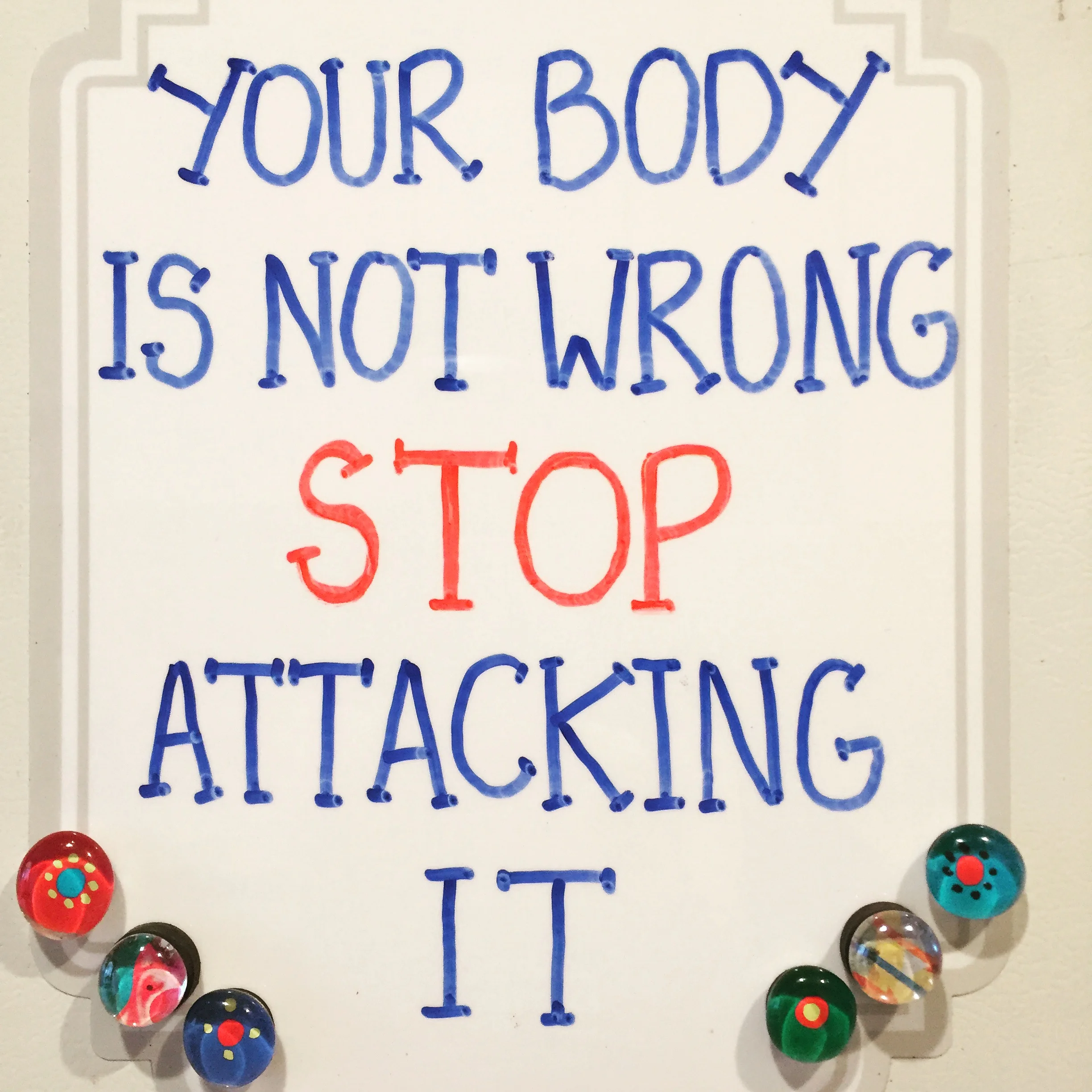I was teaching a virtual workshop to a group of moms in Texas last week when all of a sudden, I had a powerful insight:
More often than not, we judge our body as being wrong or faulty.
I was telling them my story of having had severe cystic acne in my twenties, and that the first approach I took was to see a doctor about it. The Doc’s response was, “Easy! We’ll just put you on birth control and it’ll take care of everything!”
Long story short, it didn’t.
As I told them this story and the realization I had when I stopped the birth control —that the the pills were just trying (and failing) to override the symptoms I was having— I had another powerful insight:
Most medication comes from this inherent judgment that what our body is doing is wrong and must be “corrected.”
In my case, the birth control was an attempt to use synthetic hormones to override the hormone imbalance I was having. In other words, we’re assuming that my body is failing at keeping my hormones in balance.
This assumption of the body as failing is also true for drugs such as statin drugs for cholesterol, high-blood-pressure meds, acid blockers for reflux issues, and so many others.
Most medications simply silence symptoms.*
(* To be clear, when I say that “most medications simply silence symptoms” I’m not talking about medications such as antibiotics, anti-fungal or anti-viral drugs that can stem acute infections. There’s definitely a place and circumstance for these meds, as well as the use of medication to halt severe, acute health crises. What I’m mostly referring to in this article is the use of medication to override symptoms of chronic health conditions, while failing to address the root cause of why the body is doing what it’s doing.)
The medication approach frequently fails to restore better health, and in many cases ends up creating further issues down the road.
My favorite example of complications (from forcing symptoms to back-off with a prescription) is the use of acid blockers to control acid reflux from the stomach.
Here’s the thing: the stomach is MEANT to be highly acidic. Strong stomach acid is essential for optimal digestion, which means optimal absorption of nutrients. One key nutrient that cannot be absorbed without strong stomach acid is calcium.
In fact, one of the reasons why osteoporosis and bone fractures is common in seniors is precisely because stomach acid weakens with age. Lower stomach acid results in lesser absorption of calcium, and thus bone decalcification.
Taking calcium supplements won’t necessarily help. If you don’t have strong stomach acid, your body will struggle to absorb and fix the calcium where it is needed. The BEST approach for osteoporosis is working on strengthening stomach acid and eating more dark green leafy vegetables.
Back to acid reflux…
When people have acid reflux, it is NOT a problem of too much acid. The problem is the acid leaking out of the stomach into the esophagus where it burns, because the esophagus is not coated in the mucus lining that protects the stomach from burning itself. Acid reflux is the result of a weakened esophageal valve.
Sometimes (though not always) there are other confounding factors such as an H. Pylori infection, which causes heartburn symptoms and also often gets a prescription for an acid blocker… only making matters worse, because H. Pylori thrive in a low-acid stomach.
But I digress… when people have heartburn and acid reflux the worst thing they can do is take an acid blocker.
The medication will help placate the burning symptoms, but now you’ll have some digestive issues going forward. In fact, an analysis of the incidence of osteoporosis and spontaneous bone fractures in seniors, found that people who took acid blockers for 7 years or longer had a significantly higher risk of these bone issues.
What if instead of assuming that the body is wrong and forcing symptom to back-off, we look more closely as to WHY the issue is happening in the first place?
When we look at why, we find:
Acid reflux is typically the result of stress + eating too quickly (without chewing or breathing) + pro-inflammatory foods (i.e. alcohol, too much coffee, too much sugar, fried foods, too much meat…)
Acne and other skin problems are usually the result of a liver that is over burdened, a weakened colon and high inflammation
High cholesterol is 99% of the time a sign of elevated inflammation inside the circulatory system. (The role of cholesterol is to aid in the repair of damaged artery walls and other tissues; so when you force the cholesterol down with a statin, you’ve removed the “bandaid” and you haven’t done anything to help heal the artery walls! Which is why the use of statin drugs is NOT associated with a lower risk of death from heart disease. Think about that for a minute.) (1)
In all three of these examples we can actually help the body heal and reverse the symptoms naturally.
Because symptoms are just messengers... Forcing the symptom to back-off is essentially shooting the messenger.
So instead of attacking the body and attacking the messenger as if it were wrong, how about we start from the following assumption?
The body is infinitely wise and is always seeking to balance and heal itself.
When we assume this is the case, we can then listen closely to what the body is trying to tell us. THEN we can take nurturing, healing action. In doing so, we can restore ourselves to better health, which is vastly different than simply quieting the symptoms with a pill.
If you’d like to learn more about how to restore health naturally, I invite you to consider joining the Vibrant Body, Thriving Life program. A new cohort is starting this coming week and I would LOVE to support you.
Reference:

